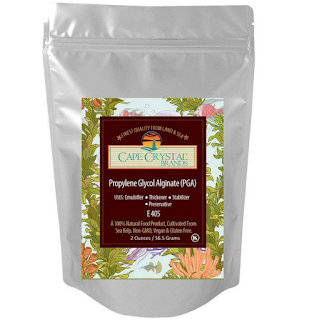Featured
- Get link
- X
- Other Apps
Propylene Glycol Alginate – How Useful Is This Food Additive?
Propylene glycol alginate or PGA is a food additive and is also an alginic acid ester that is derived from brown seaweed. The food component is used to thicken, emulsify, and stabilize. For generations, these brown seaweeds have been eaten as food, but alginates production on a large scale did not start before 1929.
This is a food additive that is synthetic and chemically similar to alcohol. The ingredient has no flavor, odor, or color. Also, it has somewhat a syrupy texture, slightly thicker than water. It can dissolve many more compounds better than water and is extremely effective in moisture preservation. Thus, it makes propyleneglycol alginate an excellent food additive and can be found in various packaged and processed foods or beverages.
Where it is used and how?
Propylene glycol is a popular additive used in preparing various foods, to enhance consistency, flavor, look, and shelf life.
Propylene glycol can be found in the following foods:
Anti-caking agent: It prevents food elements from adhering together and clumping, as in dry soups or grated cheese.
Antioxidant: It increases the duration of storage of foods by preserving them from oxygen-induced degradation.
Carrier: It dissolves other nutrients and food additives to be employed in manufacturing, such as flavors, colors, or antioxidants, are dissolved by it.
Dough strengthener: This ingredient changes the starches and gluten in the dough making it sturdier.
Emulsifier: It stops food components, such as oil and vinegar in salad dressing, from splitting.
Moisture preserver: It helps meals keep a consistent amount of moisture and prevents them from drying out. Marshmallows, coconut flakes, and nuts are some examples.
Processing aid: It is used to improve the appearance or usability of a meal, such as by making a liquid clearer.
Stabilizer and thickener: It may be used as a stabilizer and thickener for keeping food components together or to thicken them both during and following preparation.
Texturizers: Texturizers alter the look or mouthfeel of the food.
Many packaged goods include propylene glycol, including dressings, fast meals, dry soups, bread, food coloring, drink mixes, soft drinks, popcorn, cake mixes, and dairy products.
Food applications
PGA does not gel with polyvalent cations and is stable in the pH range of 3 - 5. It is utilized as a thickening and stabilizing agent in meals containing calcium or having a low pH.
One usage for propyleneglycol alginate is as an emulsion stabilizer in salad dressings when it is combined with xanthan gum. Another potential use for PGA is as a dispersion stabilizer for acid milk drinks, where it prevents precipitation. One of the unusual uses of PGA is as a froth stabilizer in beer. When a tiny amount of PGA is added to fermented beer, it develops and retains a fine froth when poured into a glass.
So, PGA is used in various foods in order to enhance processed food in various aspects. Moreover, it boosts the physical aspects of the food like color, odor, or flavor. It also increases the shelf life of those processed foods. So, if you are thinking of using this food additive, and making a purchase, make sure to buy it from a credible online platform. Consider buying it from Cape Crystals Brand. We are an online provider that offers tons of kitchen ingredients that are special and exclusive to food preparations. Visit our website (https://www.capecrystalbrands.com/) to purchase the best quality propylene glycol alginate. You can contact us at 908-273-5600, or email us at info@capecrystalbrands.com.
Popular Posts
Discover the Magic of Plant-Based Gelling Agents in Modern Cooking
- Get link
- X
- Other Apps
Reasons for the Growing Popularity of Sunflower Lecithin in the Food Industry
- Get link
- X
- Other Apps



Comments
Post a Comment